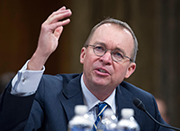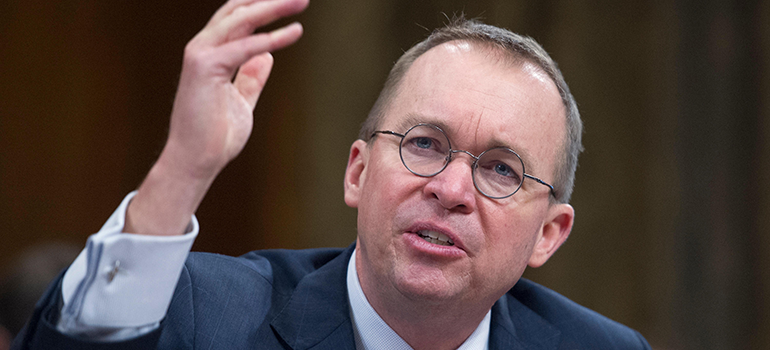
The Man Shaking Up the CFPB
 As the Trump administration prepares to name a possible nominee to lead the Consumer Financial Protection Bureau, it’s hard to get a true sense of where Acting Director Mick Mulvaney will leave the agency. Those on the left paint him as a villain, determined to dismantle the CFPB, while those on the right portray him as a hero for reining in a rogue agency. But the truth, as so often is the case, seems to lay closer to the middle of the spectrum.
As the Trump administration prepares to name a possible nominee to lead the Consumer Financial Protection Bureau, it’s hard to get a true sense of where Acting Director Mick Mulvaney will leave the agency. Those on the left paint him as a villain, determined to dismantle the CFPB, while those on the right portray him as a hero for reining in a rogue agency. But the truth, as so often is the case, seems to lay closer to the middle of the spectrum.
In his former life as a Congressman from South Carolina, Mulvaney made no bones about his opposition to the bureau, calling it a “sick, sad joke” and drafting legislation to abolish it. But people close to him say such talk should be viewed as political hyperbole instead of his actual approach to overseeing the CFPB. He tempers its ambitions, they say, hewing the CFPB closer to its express legislative mandate, but the bureau isn’t closing up shop anytime soon.
“I do not believe Mick is at all anti-regulation,” says Eric Bedingfield, Mulvaney’s former campaign manager, one-time deputy chief of staff, and long-time friend. “He understands that regulation has a place in all sectors of business and industry and life… But regulators are overstepping when they try to steer the market.”
The direction in which Mulvaney has steered the bureau since taking over last November has been informed by his approach to tackling issues, says Bedingfield: “He’s good at listening to folks. He’s good at understanding. That’s one thing he’s taught me. You can’t listen to one side of the story and form an opinion. You have to understand both sides of a problem to figure out where the middle ground is in order to fix it. Mick is great at that.”
Mulvaney’s experience in the private sector is also relevant, says Bedingfield. By the time Mulvaney entered politics in 2006, winning a seat in the South Carolina House of Representatives, he had already operated multiple businesses. He managed his own law practice in Charlotte, North Carolina, after graduating from the University of North Carolina School of Law, where he attended on a full-ride scholarship. He then joined his father’s homebuilding and real estate business to free up time when his wife learned she was pregnant with triplets. And he has also been an owner and operator of Salsarita’s Fresh Mexican Grill franchises, a company founded by a college roommate.
Mulvaney stayed interested in the financial services sector after being elected to the U.S. House of Representatives in 2010, becoming the first Republican since 1883 to represent South Carolina’s 5th Congressional District. “Mick had taken the time to listen to bankers in South Carolina from small banks, big banks, credit unions, and other financial institutions,” says Bedingfield. “He knows the government has to be involved from a regulatory standpoint, and that some regulations are necessary, but he wants to get the government out of the way of banks being prosperous and able to do business, and allowing that business to be productive and pass that goodwill down to customers.”
One can see echoes of this in Mulvaney’s statements since being appointed acting director. “We are government employees, and we work for the people,” wrote Mulvaney in a column published by The Wall Street Journal in January. “That means everyone: those who use credit cards and those who provide the credit; those who take out loans and those who make them; those who buy cars and those who sell them. All of those people are part of what makes this country great, and all of them deserve to be treated fairly by their government.”
A similar sentiment can be found in the CFPB’s recently released five-year plan. “If there is one way to summarize the strategic changes occurring at the bureau, it is this: We have committed to fulfill the bureau’s statutory responsibilities, but go no further,” Mulvaney wrote in the introduction. “Indeed, this should be an ironclad promise for any federal agency; pushing the envelope in pursuit of other objectives ignores the will of the American people, as established in law by their representatives in Congress and the White House. Pushing the envelope also risks trampling upon the liberties of our citizens, or interfering with the sovereignty or autonomy of the states or Indian tribes. I have resolved that this will not happen at the bureau.”
Consumer advocates have taken exception to the course of the CFPB under Mulvaney, whose term will expire in mid-2018. They point to the fact that the bureau has halted an investigation into a payday lending company that had contributed in the past to Mulvaney’s political campaigns, dropped a lawsuit against other payday lenders, put prepaid card rules on hold and is reconsidering aspects of its 2015 Home Mortgage Disclosure Act Rule. The bureau has also tweaked its messaging since Mulvaney took over three months ago, inserting into its stock mission statement that one of its objectives is to make consumer markets work by “regularly identifying and addressing outdated, unnecessary, or unduly burdensome regulations.”
Yet, it’s for reasons like these that the CFPB’s new direction is a welcome relief to banks, which have operated under a cloud of uncertainty since the bureau began wielding its power in earnest in 2012. Its use of enforcement actions as opposed to a formal rule-making process to effectuate its mandate has caused particular angst among bankers. At the same time, however, the changing of the guard at the CFPB should not be interpreted as a greenlight to ease up on compliance, say authorities in the field of consumer financial protection regulation.
“There is a perception out there that a lot of the requirements adopted under Richard Cordray are not something the industry has to worry about now that Mulvaney is in charge of the bureau, but that isn’t true,” says Ben Olson, a partner at Buckley Sandler, as well as the former deputy assistant director for the CFPB’s Office of Regulations. “The bureau is taking a more measured approach under Mulvaney, but it’s still pursuing its mandate. The former rules and regulations haven’t gone away. They’re still there. And the penalties for violating them still apply.”
This same point was made by Rick Fischer, a partner in the Washington, D.C. office of the law firm Morrison & Foerster. “Under Mulvaney, the problematic nature of regulating by enforcement actions is a thing of the past,” says Fischer. “But we don’t know who the permanent director is going to be. That person is going to have to get through Senate confirmation, which is tougher today than it was six to eight months ago. The game is not over, in other words, so banks ought to continue doing what they’ve been doing.”
“There’s a lot less risk that banks will be pursued by the bureau if they’ve tried in good faith to follow the rules,” agrees Richard Hills, a partner at Waller, a law firm headquartered Nashville, Tennessee. “But this isn’t the time to get complacent because there are still other regulators out there enforcing consumer finance laws.”
States in particular seem to be intent on filling any perceived void left by the CFPB’s retreat. “At the state level, there has been and will continue to be a rise in activism, particularly in areas where states perceive a gap left by the CFPB’s new approach,” says Quyen Truong, a Washington, D.C.-based partner at Strook, as well as the former CFPB deputy general counsel. “That could come through state attorneys general offices as well as state regulatory agencies. The states need to gather resources and focus their efforts, but the ramp up has begun.”
The one universal piece of advice that attorneys urge banks to follow is to have their voices heard. “The CFPB is soliciting input from the industry and is looking specifically to hear from individual institutions, thus negating concerns about any adverse impact from individual participation,” says Truong. “This is a terrific opportunity to advocate for change at the bureau, and to do so directly, in tandem with trade associations. But it should be done in a strategic way, by identifying issues and marshalling data, so that any changes enacted will survive legal challenge and the test of time.”

Join OUr Community
Bank Director’s annual Bank Services Membership Program combines Bank Director’s extensive online library of director training materials, conferences, our quarterly publication, and access to FinXTech Connect.
Become a Member
Our commitment to those leaders who believe a strong board makes a strong bank never wavers.



